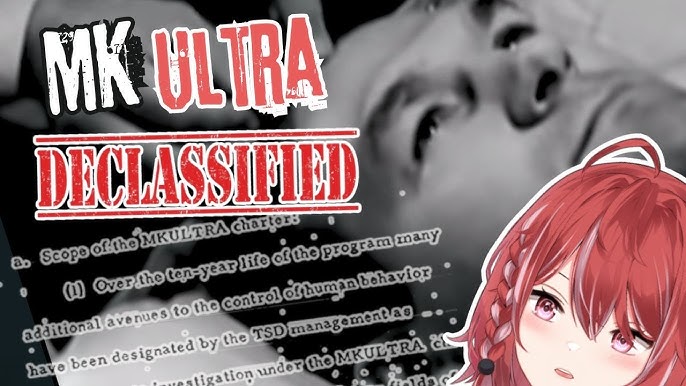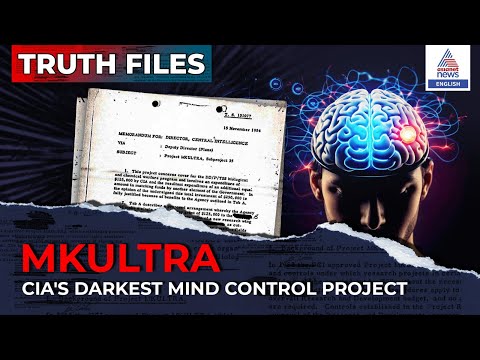The MKUltra Papers: Following the Money and Unmasking the Scope of CIA Mind Control

Project MKUltra, the CIA's infamous mind control program, remains a chilling example of government overreach and ethical transgression. While the broad strokes of MKUltra are widely known – the unethical experimentation on unwitting citizens, the use of drugs like LSD, and the relentless pursuit of "brainwashing" techniques – the declassified documents continue to reveal disturbing details about its operational scope and the deliberate efforts to conceal its true nature. This isn’t just about historical curiosity; understanding MKUltra is crucial for comprehending the long-term patterns of power and secrecy within government agencies. We'll be diving into the financial aspects of the program, specifically exploring documented funding and its implications, utilizing declassified CIA documents.
The Paper Trail: Following the Money Behind MKUltra Experiments
One of the most compelling aspects of MKUltra is the sheer amount of money poured into the project and the methods used to obscure its source. Declassified budget documents, accessible through the National Archives and Records Administration, reveal a complex web of funding channels designed to conceal the CIA’s involvement. These documents highlight a blatant disregard for ethical boundaries and a calculated effort to circumvent oversight. These records, pieced together, paint a picture far more extensive than the official narrative often suggests.
For example, a declassified CIA memorandum titled “Third Interim Report on Project MKULTRA” (released under the Freedom of Information Act) details various subprojects and their respective funding allocations. What’s striking is the ambiguity surrounding the exact nature of the research being funded. Line items are often vaguely worded, using terms like “behavioral research” or “personality assessment,” masking the true, often invasive, nature of the experiments. This deliberate obfuscation makes it incredibly difficult to ascertain the full extent of the program and the specific activities being conducted.

The Role of Front Organizations and Academic Institutions
The CIA cleverly utilized front organizations and unwitting academic institutions to conduct MKUltra experiments, further distancing themselves from direct involvement. Universities and research facilities across the United States became unwitting participants, receiving funding for projects that, in reality, served the CIA’s mind control objectives.
Dr. Ewen Cameron at McGill University’s Allan Memorial Institute in Montreal is a prime example. Cameron received substantial funding from the CIA through the Society for the Investigation of Human Ecology, a known CIA front. He conducted "depatterning" experiments on patients, subjecting them to prolonged periods of induced coma, electroshock therapy, and sensory deprivation. These procedures, intended to erase existing behavioral patterns and reprogram the mind, resulted in severe psychological damage to his patients.
The CIA's exploitation of respected institutions raises disturbing questions about the ethical responsibilities of academic researchers and the potential for government agencies to manipulate the scientific community for their own purposes. How many other institutions were similarly compromised? What measures were in place (or, more accurately, not in place) to prevent such abuses?

The "Accidental" Destruction of Records: A Convenient Loss
In 1973, CIA Director Richard Helms ordered the destruction of most MKUltra documents, citing concerns about potential public exposure. This action represents a critical point in the history of MKUltra, effectively erasing a significant portion of the paper trail and hindering subsequent investigations. The official explanation – that the documents were destroyed to prevent them from falling into the wrong hands – strains credulity. More likely, the destruction was a deliberate attempt to bury the evidence of illegal and unethical activities.
While some documents survived, thanks to being misfiled or stored in locations unknown to Helms, the loss of the majority of the records severely limits our ability to fully understand the scope and consequences of MKUltra. This "accidental" survival of a few key documents, like the memorandum mentioned above, highlights just how much more information may have been deliberately lost.

Statistical Improbabilities: The sheer Scale of the Subprojects
The sheer number of MKUltra subprojects raises serious questions about the true objectives of the program. Officially, MKUltra was intended to explore potential methods of mind control and interrogation techniques. However, the sheer volume and variety of subprojects – estimated to be around 149, according to Church Committee reports – suggest a much broader agenda.
Consider the statistical improbability of so many diverse research areas all contributing meaningfully to a narrow goal like interrogation. Subprojects ranged from drug testing to hypnosis to parapsychology. Was the CIA genuinely exploring every conceivable avenue of mind control, or was MKUltra a smokescreen for other, undisclosed activities? The sheer scale of the program defies easy explanation and fuels speculation about hidden agendas.

The Unaccounted For: The Victims of MKUltra
Perhaps the most disturbing aspect of MKUltra is the suffering inflicted on its victims. Many of those subjected to experimentation were unaware of the true nature of the research and did not provide informed consent. They were often vulnerable individuals – psychiatric patients, prisoners, and marginalized members of society – making them easy targets for exploitation.
While some victims have come forward and received compensation through legal settlements, the true number of individuals affected by MKUltra remains unknown. The destruction of records and the deliberate obfuscation of the program make it incredibly difficult to identify and assist all those who suffered as a result of these unethical experiments.
The ethical implications are staggering. The government, entrusted with protecting its citizens, instead subjected them to horrific experiments without their knowledge or consent. This betrayal of trust has lasting consequences and demands a full accounting of the truth.

Project ARTICHOKE: The Precursor to MKUltra
It is important to consider the origins of MKUltra. Preceding MKUltra was Project ARTICHOKE, which explored similar mind control and interrogation techniques but often targeted foreign nationals. The transition from ARTICHOKE to MKUltra signifies an escalation in the scope and ambition of the CIA's mind control efforts, expanding the experimentation to include American citizens on American soil.
The continuity between these projects demonstrates a long-term commitment within the CIA to explore and develop mind control technologies, regardless of the ethical implications. Understanding this historical context is crucial for comprehending the motivations and objectives behind MKUltra.

The Enduring Legacy of MKUltra
MKUltra officially ended in 1973, but its legacy continues to haunt us. The ethical breaches committed during the program raise fundamental questions about government accountability and the potential for abuse of power. While the CIA has acknowledged the unethical nature of MKUltra, the full truth about the program remains elusive. The deliberate destruction of records and the ongoing secrecy surrounding certain aspects of the program hinder our ability to fully understand its scope and consequences.
The declassified documents provide a glimpse into the dark world of MKUltra, but they also serve as a reminder of the importance of vigilance and critical thinking. We must continue to demand transparency from our government and hold those in power accountable for their actions. The lessons of MKUltra must never be forgotten.

Moving Forward: Demanding Transparency and Accountability
The story of MKUltra is a stark reminder that government secrecy can have devastating consequences. To prevent similar abuses from occurring in the future, we must demand greater transparency and accountability from our intelligence agencies. This includes:
- Full declassification of all remaining MKUltra-related documents: The public has a right to know the full extent of the program and its impact.
- Independent investigations into allegations of ongoing mind control research: Concerns persist about the possibility of similar programs continuing under different names.
- Strengthening ethical oversight of government-funded research: Measures must be put in place to prevent the exploitation of vulnerable individuals in scientific experiments.
Only through continued vigilance and a commitment to transparency can we ensure that the lessons of MKUltra are truly learned and that such atrocities never happen again.
